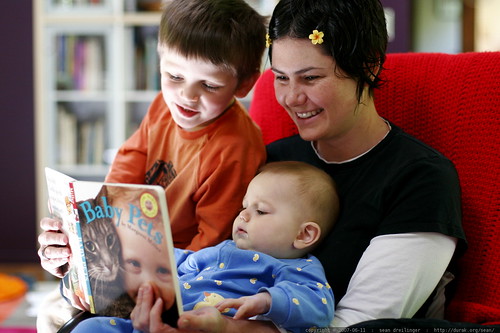“On a perfect day in your perfect little world (and it’s always perfect) there is breakfast time, playtime, lunchtime, nap time, snack time, dinnertime, bath time, story time, and bedtime. There is time for everything when you are the timekeeper.” Karen Maezen Miller from Momma Zen, Walking The Crooked Path of Motherhood
Update: This is the third post in a series of ten on gentle, effective ways to discipline children. Today’s post talks about the importance of establishing daily rhythms, rituals, and routines, in order to help your child know what to expect. In Dear Parent, Magda Gerber writes:
“Being exposed to circumstances we cannot anticipate nor understand, and in which we cannot actively participate, makes us feel helpless, like riding on a perpetual merry-go-round. Anticipating a change, on the other hand, gives us a feeling of being prepared, of being in control.”
Establishing consistent daily routines can go a long way in helping to make life with a toddler more joyful, and less harried. This does not mean instituting a rigid schedule of eating, sleeping, and activities, but rather, establishing a predictable sequence of events that happen in a particular order, so your child can know what to expect from day to day. Daily routines give toddlers a sense of control. As they come to know what to expect, they can begin to predict and anticipate ways in which they might participate.
Can you imagine what it would feel like if you had no say over your daily activities, and they changed from day to day without notice or warning ? How cheerful and co-operative do you think you could manage to be in such circumstances? What may be a nice break in routine and feel spontaneous for us as adults, is often confusing and disorienting for toddlers.
In fact, one of the best definitions I’ve ever heard regarding how to gauge if I was being consistent and slowing down enough to allow a young toddler to keep up with me is as follows: If you find yourself feeling slightly bored, or like everything about the day is moving in slow motion, there is a good chance you are going at the right pace for a toddler! Toddlers like routine- it’s why they ask us to read the same book or repeat the same game again and again.
Young children are oriented in present time, move at a slower pace than we do, and need more tarry time to process events or incoming stimuli. I can hear you asking, “What the heck is tarry time ?” Tarry time is simply the “silence between interactions” or the amount of time it takes for a child (or an adult for that matter) to process and respond to incoming information- what someone has just said, a change in body position, or a change in activity.
As adults, most of us are able to process and respond to incoming physical and verbal information very quickly (think of a nurse in an emergency room) but young children need a longer time to absorb and respond (to verbal requests especially) because everything is still so new to them. They are just figuring out how things work, and what words mean. Toddlers are not trying to manipulate adults when they don’t immediately react to a spoken request. (This is why it is so important to slow down, make sure you have your child’s attention, and not to over-talk a situation, or repeat yourself constantly.)
Here’s one of my favorite examples of tarry time: I was the site supervisor of a toddler childcare center for two years. Parents and their children passed right by my office door on their way in and out every day and often stopped to say good morning or goodnight. At the end of the day, Mom or Dad would often be carrying their little one, lugging all of their stuff, trying to sign out, and saying goodbye to me at the same time. Inevitably, the conversations I had with families were short at this time of day; parents and children were both tired and wanted to get home after a long day.
As parents alternately chatted with me and their children, while simultaneously trying to get out the door, they’d often say,”Wave bye- bye to Lisa. We’ll see her tomorrow. It’s time to go home. Why don’t you wave? You know how to wave bye- bye.”
Hardly ever did a child wave goodbye- at least not that the parent knew about! You see, there was a window just inside my office that I knew parent and child would pass by on their way to the car. I would move to that window just after a family exited the building, and ten times out of ten, the child would notice me and would wave goodbye. This was tarry time in action! Mom or Dad was already mentally preparing to deal with traffic on the way home, planning what to eat for dinner, hoping the plumber had showed up, etc., while the child was just processing the idea that it was time to say goodbye!
We give children a wonderful gift as well as foster the opportunity for mutual co-operation and communication, when we are able and willing to SLOW DOWN and wait for a child’s response. Establishing regular daily rhythms and routines further helps children learn to co-operate, because routines provide safety and structure, and children come to know what to expect and are thus able to predict and participate more fully in whatever is happening.
Do you find it easy or difficult to slow down, and to create predictable routines for your child? Do you enjoy any special daily rituals together?
Tomorrow: the importance of rest, exercise, and good nourishment!

4 thoughts on “It’s All Routine”
Comments are closed.